Ethical Implications of Self-Driving Cars: A Comprehensive Analysis
VerifiedAdded on 2021/06/17
|6
|1646
|28
Essay
AI Summary
This essay provides a comprehensive analysis of self-driving cars, examining their ethical implications through the lens of four classical ethical theories: utilitarianism, deontology, virtue ethics, and contract theory. The essay begins by introducing a case study involving a collision caused by Google's self-driving car, highlighting the flaws in automation. It then explores each ethical theory, defining their core principles, limitations, and their application to the case study. The essay evaluates how each theory addresses the ethical questions raised by autonomous vehicles, such as accountability for software glitches, the impact on human jobs, and safety concerns. The analysis concludes by comparing the strengths and weaknesses of each theory, with the contract theory emerging as the most effective framework for addressing the complex ethical considerations of self-driving car technology, particularly in establishing safety standards and addressing potential misconduct.
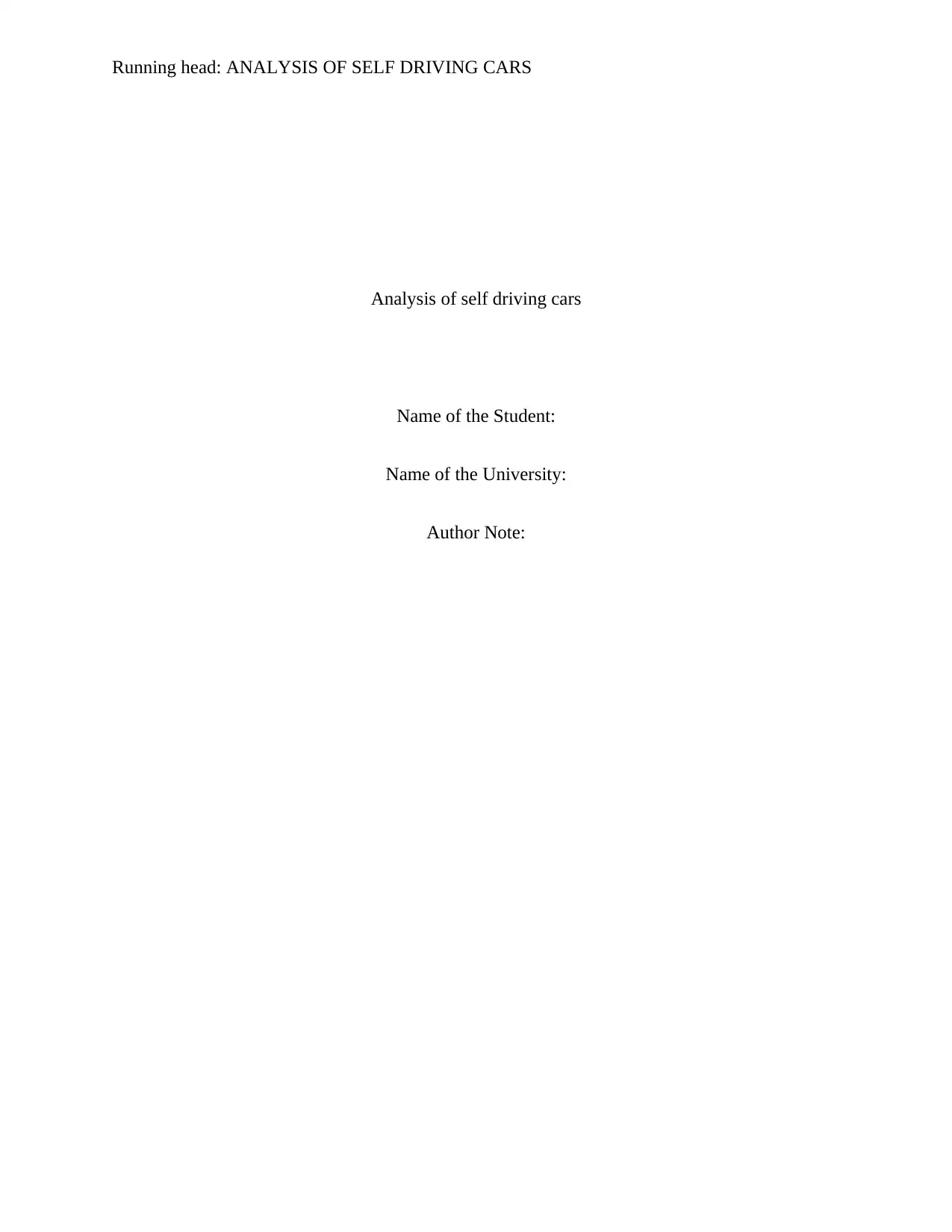
Running head: ANALYSIS OF SELF DRIVING CARS
Analysis of self driving cars
Name of the Student:
Name of the University:
Author Note:
Analysis of self driving cars
Name of the Student:
Name of the University:
Author Note:
Paraphrase This Document
Need a fresh take? Get an instant paraphrase of this document with our AI Paraphraser
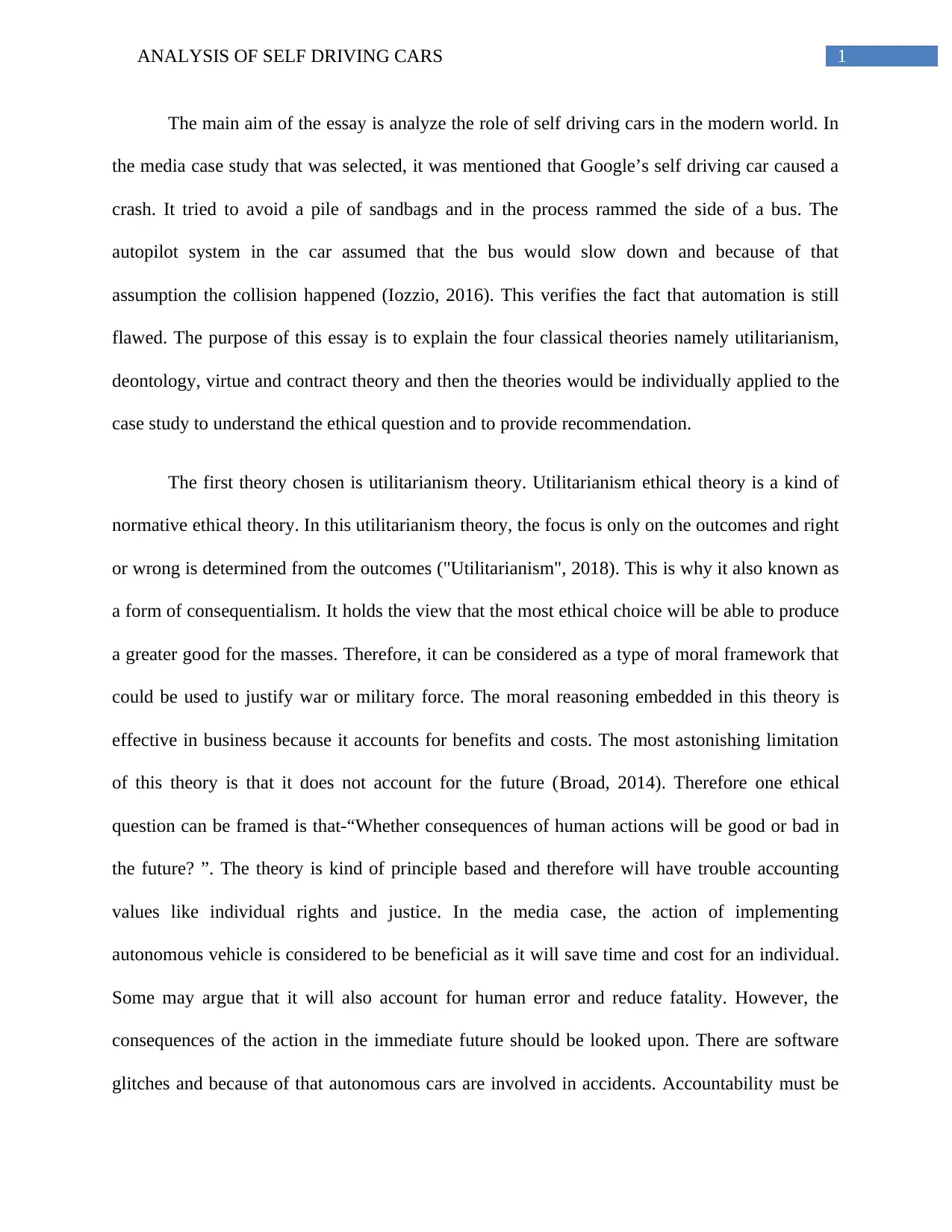
1ANALYSIS OF SELF DRIVING CARS
The main aim of the essay is analyze the role of self driving cars in the modern world. In
the media case study that was selected, it was mentioned that Google’s self driving car caused a
crash. It tried to avoid a pile of sandbags and in the process rammed the side of a bus. The
autopilot system in the car assumed that the bus would slow down and because of that
assumption the collision happened (Iozzio, 2016). This verifies the fact that automation is still
flawed. The purpose of this essay is to explain the four classical theories namely utilitarianism,
deontology, virtue and contract theory and then the theories would be individually applied to the
case study to understand the ethical question and to provide recommendation.
The first theory chosen is utilitarianism theory. Utilitarianism ethical theory is a kind of
normative ethical theory. In this utilitarianism theory, the focus is only on the outcomes and right
or wrong is determined from the outcomes ("Utilitarianism", 2018). This is why it also known as
a form of consequentialism. It holds the view that the most ethical choice will be able to produce
a greater good for the masses. Therefore, it can be considered as a type of moral framework that
could be used to justify war or military force. The moral reasoning embedded in this theory is
effective in business because it accounts for benefits and costs. The most astonishing limitation
of this theory is that it does not account for the future (Broad, 2014). Therefore one ethical
question can be framed is that-“Whether consequences of human actions will be good or bad in
the future? ”. The theory is kind of principle based and therefore will have trouble accounting
values like individual rights and justice. In the media case, the action of implementing
autonomous vehicle is considered to be beneficial as it will save time and cost for an individual.
Some may argue that it will also account for human error and reduce fatality. However, the
consequences of the action in the immediate future should be looked upon. There are software
glitches and because of that autonomous cars are involved in accidents. Accountability must be
The main aim of the essay is analyze the role of self driving cars in the modern world. In
the media case study that was selected, it was mentioned that Google’s self driving car caused a
crash. It tried to avoid a pile of sandbags and in the process rammed the side of a bus. The
autopilot system in the car assumed that the bus would slow down and because of that
assumption the collision happened (Iozzio, 2016). This verifies the fact that automation is still
flawed. The purpose of this essay is to explain the four classical theories namely utilitarianism,
deontology, virtue and contract theory and then the theories would be individually applied to the
case study to understand the ethical question and to provide recommendation.
The first theory chosen is utilitarianism theory. Utilitarianism ethical theory is a kind of
normative ethical theory. In this utilitarianism theory, the focus is only on the outcomes and right
or wrong is determined from the outcomes ("Utilitarianism", 2018). This is why it also known as
a form of consequentialism. It holds the view that the most ethical choice will be able to produce
a greater good for the masses. Therefore, it can be considered as a type of moral framework that
could be used to justify war or military force. The moral reasoning embedded in this theory is
effective in business because it accounts for benefits and costs. The most astonishing limitation
of this theory is that it does not account for the future (Broad, 2014). Therefore one ethical
question can be framed is that-“Whether consequences of human actions will be good or bad in
the future? ”. The theory is kind of principle based and therefore will have trouble accounting
values like individual rights and justice. In the media case, the action of implementing
autonomous vehicle is considered to be beneficial as it will save time and cost for an individual.
Some may argue that it will also account for human error and reduce fatality. However, the
consequences of the action in the immediate future should be looked upon. There are software
glitches and because of that autonomous cars are involved in accidents. Accountability must be
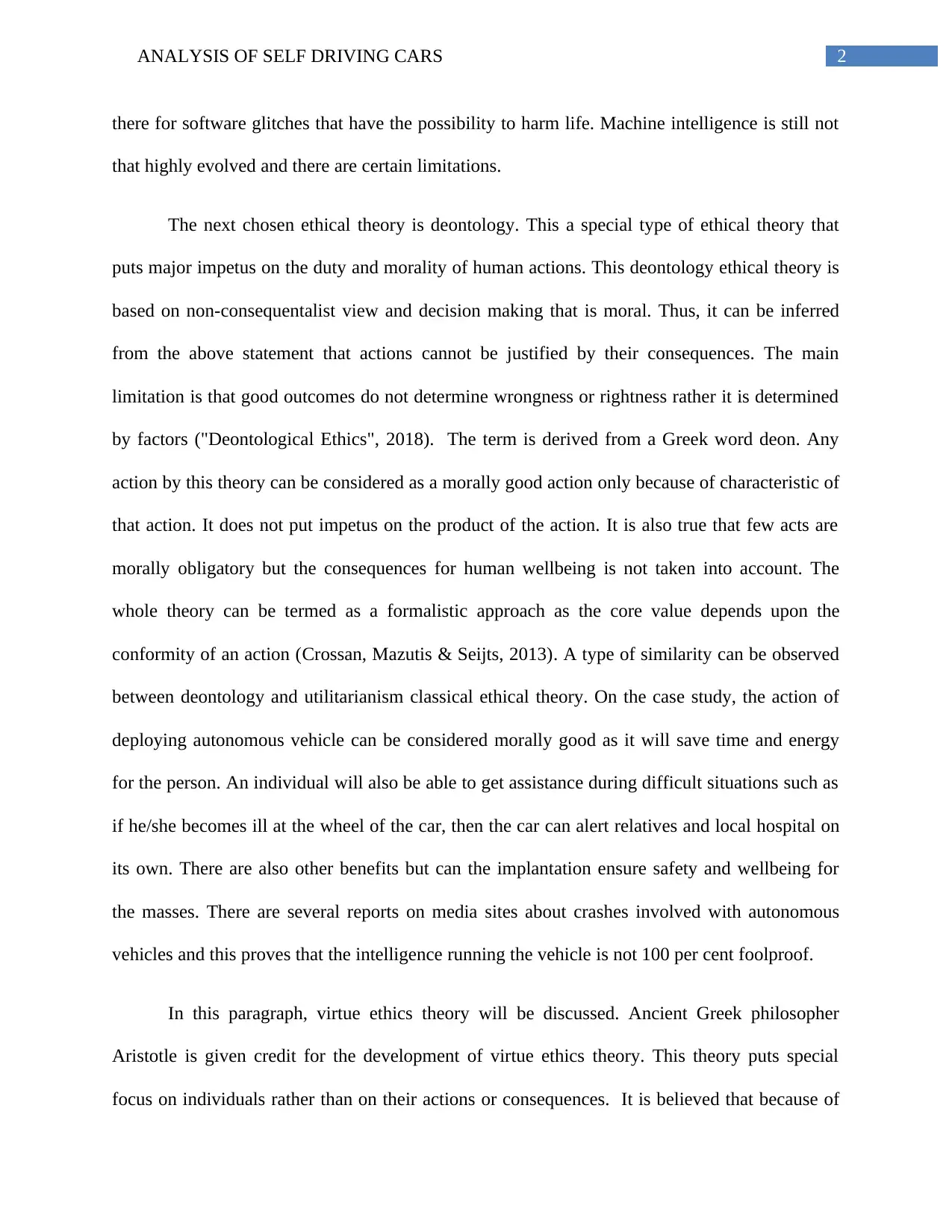
2ANALYSIS OF SELF DRIVING CARS
there for software glitches that have the possibility to harm life. Machine intelligence is still not
that highly evolved and there are certain limitations.
The next chosen ethical theory is deontology. This a special type of ethical theory that
puts major impetus on the duty and morality of human actions. This deontology ethical theory is
based on non-consequentalist view and decision making that is moral. Thus, it can be inferred
from the above statement that actions cannot be justified by their consequences. The main
limitation is that good outcomes do not determine wrongness or rightness rather it is determined
by factors ("Deontological Ethics", 2018). The term is derived from a Greek word deon. Any
action by this theory can be considered as a morally good action only because of characteristic of
that action. It does not put impetus on the product of the action. It is also true that few acts are
morally obligatory but the consequences for human wellbeing is not taken into account. The
whole theory can be termed as a formalistic approach as the core value depends upon the
conformity of an action (Crossan, Mazutis & Seijts, 2013). A type of similarity can be observed
between deontology and utilitarianism classical ethical theory. On the case study, the action of
deploying autonomous vehicle can be considered morally good as it will save time and energy
for the person. An individual will also be able to get assistance during difficult situations such as
if he/she becomes ill at the wheel of the car, then the car can alert relatives and local hospital on
its own. There are also other benefits but can the implantation ensure safety and wellbeing for
the masses. There are several reports on media sites about crashes involved with autonomous
vehicles and this proves that the intelligence running the vehicle is not 100 per cent foolproof.
In this paragraph, virtue ethics theory will be discussed. Ancient Greek philosopher
Aristotle is given credit for the development of virtue ethics theory. This theory puts special
focus on individuals rather than on their actions or consequences. It is believed that because of
there for software glitches that have the possibility to harm life. Machine intelligence is still not
that highly evolved and there are certain limitations.
The next chosen ethical theory is deontology. This a special type of ethical theory that
puts major impetus on the duty and morality of human actions. This deontology ethical theory is
based on non-consequentalist view and decision making that is moral. Thus, it can be inferred
from the above statement that actions cannot be justified by their consequences. The main
limitation is that good outcomes do not determine wrongness or rightness rather it is determined
by factors ("Deontological Ethics", 2018). The term is derived from a Greek word deon. Any
action by this theory can be considered as a morally good action only because of characteristic of
that action. It does not put impetus on the product of the action. It is also true that few acts are
morally obligatory but the consequences for human wellbeing is not taken into account. The
whole theory can be termed as a formalistic approach as the core value depends upon the
conformity of an action (Crossan, Mazutis & Seijts, 2013). A type of similarity can be observed
between deontology and utilitarianism classical ethical theory. On the case study, the action of
deploying autonomous vehicle can be considered morally good as it will save time and energy
for the person. An individual will also be able to get assistance during difficult situations such as
if he/she becomes ill at the wheel of the car, then the car can alert relatives and local hospital on
its own. There are also other benefits but can the implantation ensure safety and wellbeing for
the masses. There are several reports on media sites about crashes involved with autonomous
vehicles and this proves that the intelligence running the vehicle is not 100 per cent foolproof.
In this paragraph, virtue ethics theory will be discussed. Ancient Greek philosopher
Aristotle is given credit for the development of virtue ethics theory. This theory puts special
focus on individuals rather than on their actions or consequences. It is believed that because of
⊘ This is a preview!⊘
Do you want full access?
Subscribe today to unlock all pages.

Trusted by 1+ million students worldwide
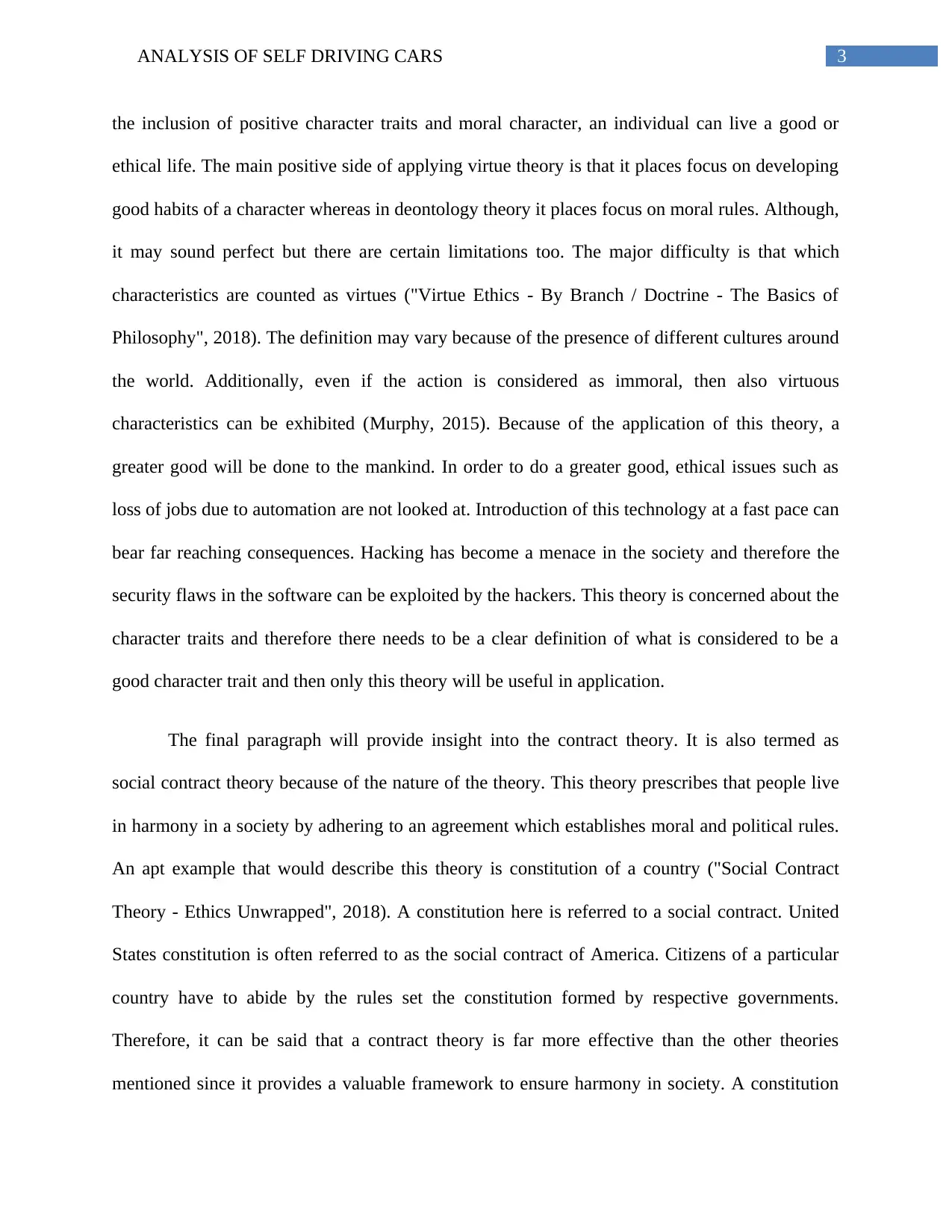
3ANALYSIS OF SELF DRIVING CARS
the inclusion of positive character traits and moral character, an individual can live a good or
ethical life. The main positive side of applying virtue theory is that it places focus on developing
good habits of a character whereas in deontology theory it places focus on moral rules. Although,
it may sound perfect but there are certain limitations too. The major difficulty is that which
characteristics are counted as virtues ("Virtue Ethics - By Branch / Doctrine - The Basics of
Philosophy", 2018). The definition may vary because of the presence of different cultures around
the world. Additionally, even if the action is considered as immoral, then also virtuous
characteristics can be exhibited (Murphy, 2015). Because of the application of this theory, a
greater good will be done to the mankind. In order to do a greater good, ethical issues such as
loss of jobs due to automation are not looked at. Introduction of this technology at a fast pace can
bear far reaching consequences. Hacking has become a menace in the society and therefore the
security flaws in the software can be exploited by the hackers. This theory is concerned about the
character traits and therefore there needs to be a clear definition of what is considered to be a
good character trait and then only this theory will be useful in application.
The final paragraph will provide insight into the contract theory. It is also termed as
social contract theory because of the nature of the theory. This theory prescribes that people live
in harmony in a society by adhering to an agreement which establishes moral and political rules.
An apt example that would describe this theory is constitution of a country ("Social Contract
Theory - Ethics Unwrapped", 2018). A constitution here is referred to a social contract. United
States constitution is often referred to as the social contract of America. Citizens of a particular
country have to abide by the rules set the constitution formed by respective governments.
Therefore, it can be said that a contract theory is far more effective than the other theories
mentioned since it provides a valuable framework to ensure harmony in society. A constitution
the inclusion of positive character traits and moral character, an individual can live a good or
ethical life. The main positive side of applying virtue theory is that it places focus on developing
good habits of a character whereas in deontology theory it places focus on moral rules. Although,
it may sound perfect but there are certain limitations too. The major difficulty is that which
characteristics are counted as virtues ("Virtue Ethics - By Branch / Doctrine - The Basics of
Philosophy", 2018). The definition may vary because of the presence of different cultures around
the world. Additionally, even if the action is considered as immoral, then also virtuous
characteristics can be exhibited (Murphy, 2015). Because of the application of this theory, a
greater good will be done to the mankind. In order to do a greater good, ethical issues such as
loss of jobs due to automation are not looked at. Introduction of this technology at a fast pace can
bear far reaching consequences. Hacking has become a menace in the society and therefore the
security flaws in the software can be exploited by the hackers. This theory is concerned about the
character traits and therefore there needs to be a clear definition of what is considered to be a
good character trait and then only this theory will be useful in application.
The final paragraph will provide insight into the contract theory. It is also termed as
social contract theory because of the nature of the theory. This theory prescribes that people live
in harmony in a society by adhering to an agreement which establishes moral and political rules.
An apt example that would describe this theory is constitution of a country ("Social Contract
Theory - Ethics Unwrapped", 2018). A constitution here is referred to a social contract. United
States constitution is often referred to as the social contract of America. Citizens of a particular
country have to abide by the rules set the constitution formed by respective governments.
Therefore, it can be said that a contract theory is far more effective than the other theories
mentioned since it provides a valuable framework to ensure harmony in society. A constitution
Paraphrase This Document
Need a fresh take? Get an instant paraphrase of this document with our AI Paraphraser
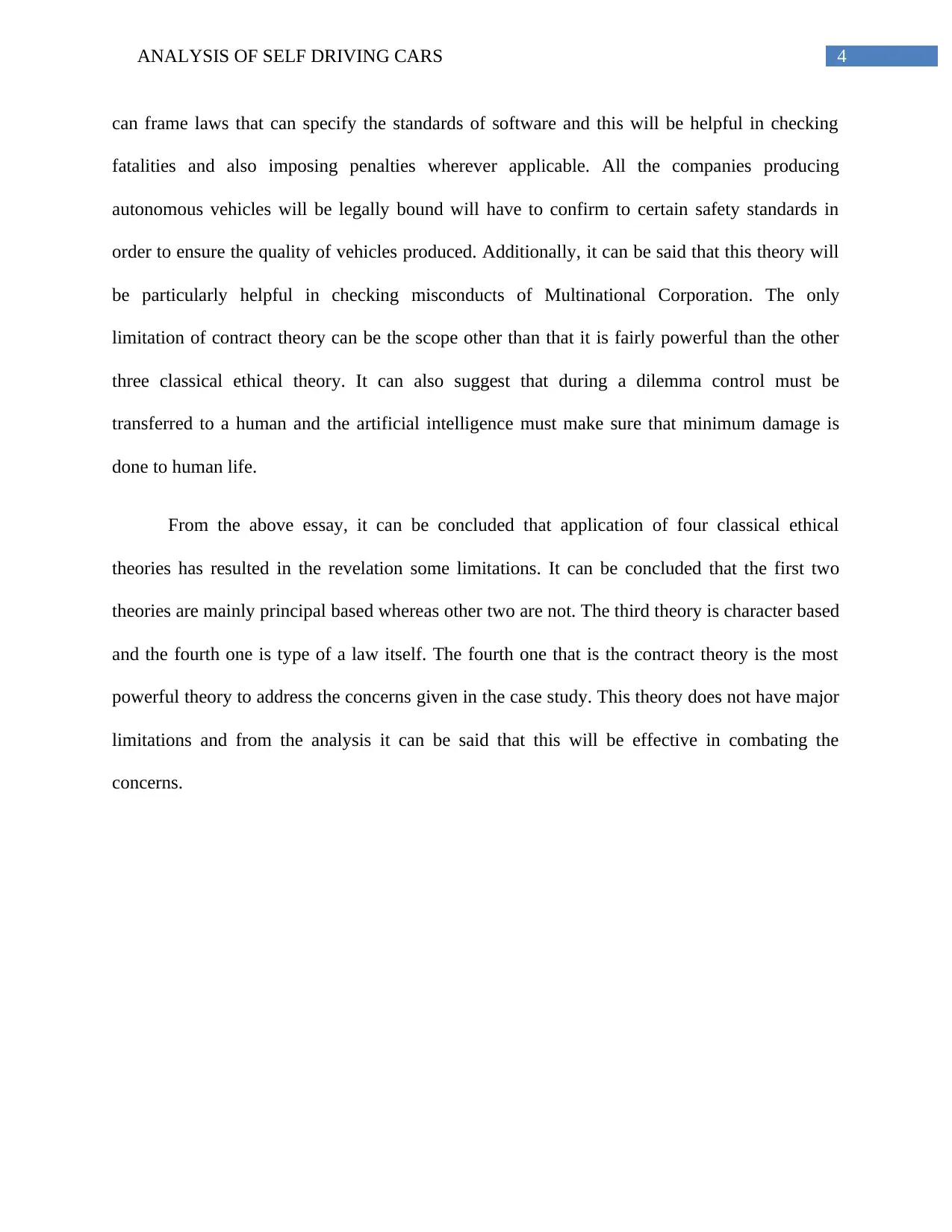
4ANALYSIS OF SELF DRIVING CARS
can frame laws that can specify the standards of software and this will be helpful in checking
fatalities and also imposing penalties wherever applicable. All the companies producing
autonomous vehicles will be legally bound will have to confirm to certain safety standards in
order to ensure the quality of vehicles produced. Additionally, it can be said that this theory will
be particularly helpful in checking misconducts of Multinational Corporation. The only
limitation of contract theory can be the scope other than that it is fairly powerful than the other
three classical ethical theory. It can also suggest that during a dilemma control must be
transferred to a human and the artificial intelligence must make sure that minimum damage is
done to human life.
From the above essay, it can be concluded that application of four classical ethical
theories has resulted in the revelation some limitations. It can be concluded that the first two
theories are mainly principal based whereas other two are not. The third theory is character based
and the fourth one is type of a law itself. The fourth one that is the contract theory is the most
powerful theory to address the concerns given in the case study. This theory does not have major
limitations and from the analysis it can be said that this will be effective in combating the
concerns.
can frame laws that can specify the standards of software and this will be helpful in checking
fatalities and also imposing penalties wherever applicable. All the companies producing
autonomous vehicles will be legally bound will have to confirm to certain safety standards in
order to ensure the quality of vehicles produced. Additionally, it can be said that this theory will
be particularly helpful in checking misconducts of Multinational Corporation. The only
limitation of contract theory can be the scope other than that it is fairly powerful than the other
three classical ethical theory. It can also suggest that during a dilemma control must be
transferred to a human and the artificial intelligence must make sure that minimum damage is
done to human life.
From the above essay, it can be concluded that application of four classical ethical
theories has resulted in the revelation some limitations. It can be concluded that the first two
theories are mainly principal based whereas other two are not. The third theory is character based
and the fourth one is type of a law itself. The fourth one that is the contract theory is the most
powerful theory to address the concerns given in the case study. This theory does not have major
limitations and from the analysis it can be said that this will be effective in combating the
concerns.
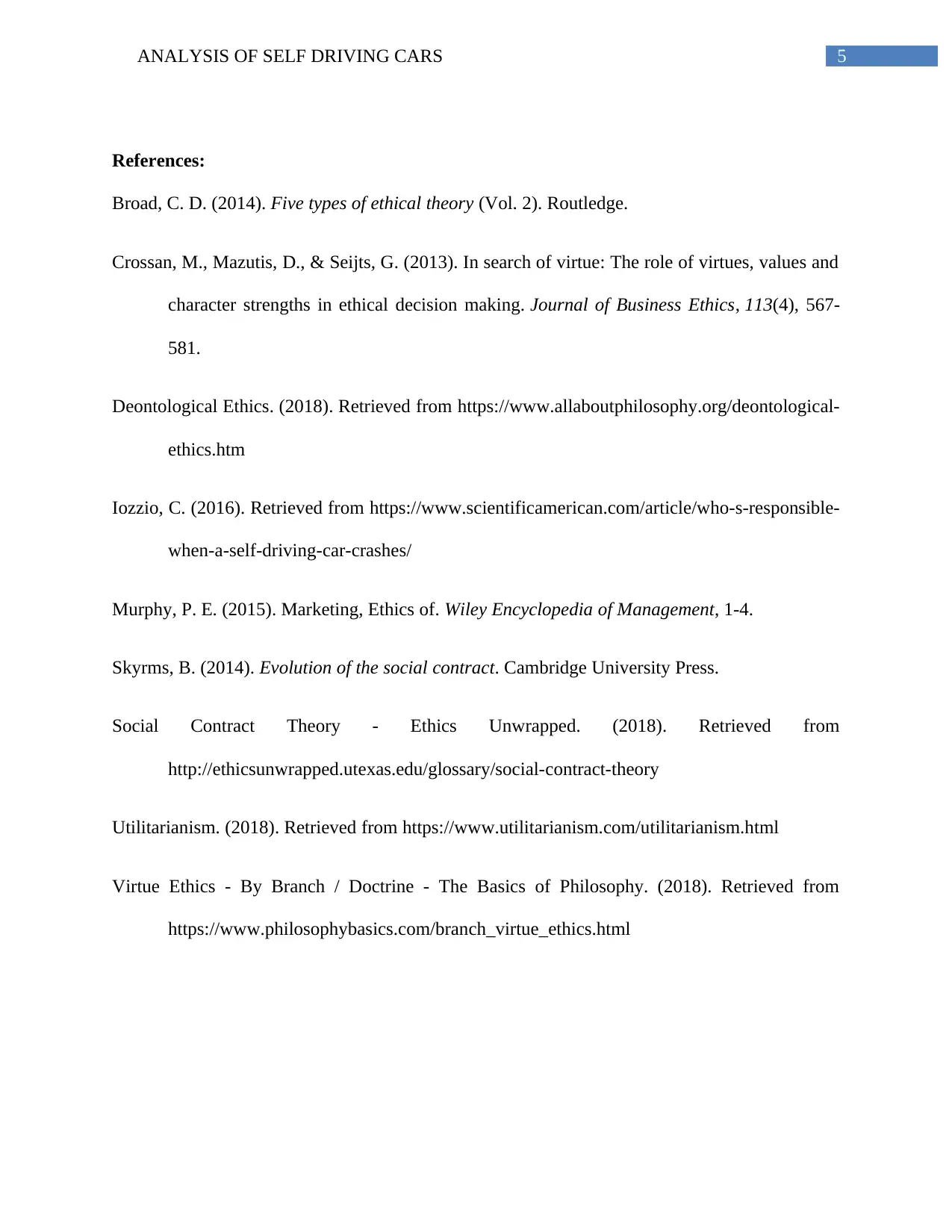
5ANALYSIS OF SELF DRIVING CARS
References:
Broad, C. D. (2014). Five types of ethical theory (Vol. 2). Routledge.
Crossan, M., Mazutis, D., & Seijts, G. (2013). In search of virtue: The role of virtues, values and
character strengths in ethical decision making. Journal of Business Ethics, 113(4), 567-
581.
Deontological Ethics. (2018). Retrieved from https://www.allaboutphilosophy.org/deontological-
ethics.htm
Iozzio, C. (2016). Retrieved from https://www.scientificamerican.com/article/who-s-responsible-
when-a-self-driving-car-crashes/
Murphy, P. E. (2015). Marketing, Ethics of. Wiley Encyclopedia of Management, 1-4.
Skyrms, B. (2014). Evolution of the social contract. Cambridge University Press.
Social Contract Theory - Ethics Unwrapped. (2018). Retrieved from
http://ethicsunwrapped.utexas.edu/glossary/social-contract-theory
Utilitarianism. (2018). Retrieved from https://www.utilitarianism.com/utilitarianism.html
Virtue Ethics - By Branch / Doctrine - The Basics of Philosophy. (2018). Retrieved from
https://www.philosophybasics.com/branch_virtue_ethics.html
References:
Broad, C. D. (2014). Five types of ethical theory (Vol. 2). Routledge.
Crossan, M., Mazutis, D., & Seijts, G. (2013). In search of virtue: The role of virtues, values and
character strengths in ethical decision making. Journal of Business Ethics, 113(4), 567-
581.
Deontological Ethics. (2018). Retrieved from https://www.allaboutphilosophy.org/deontological-
ethics.htm
Iozzio, C. (2016). Retrieved from https://www.scientificamerican.com/article/who-s-responsible-
when-a-self-driving-car-crashes/
Murphy, P. E. (2015). Marketing, Ethics of. Wiley Encyclopedia of Management, 1-4.
Skyrms, B. (2014). Evolution of the social contract. Cambridge University Press.
Social Contract Theory - Ethics Unwrapped. (2018). Retrieved from
http://ethicsunwrapped.utexas.edu/glossary/social-contract-theory
Utilitarianism. (2018). Retrieved from https://www.utilitarianism.com/utilitarianism.html
Virtue Ethics - By Branch / Doctrine - The Basics of Philosophy. (2018). Retrieved from
https://www.philosophybasics.com/branch_virtue_ethics.html
⊘ This is a preview!⊘
Do you want full access?
Subscribe today to unlock all pages.

Trusted by 1+ million students worldwide
1 out of 6
Related Documents
Your All-in-One AI-Powered Toolkit for Academic Success.
+13062052269
info@desklib.com
Available 24*7 on WhatsApp / Email
![[object Object]](/_next/static/media/star-bottom.7253800d.svg)
Unlock your academic potential
Copyright © 2020–2025 A2Z Services. All Rights Reserved. Developed and managed by ZUCOL.




